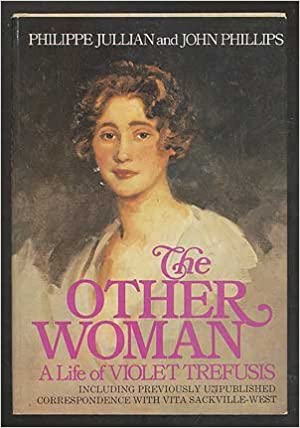The Other Woman
A Life of Violet Trefusis
Philippe Jullian; John Phillips

Violet was the daughter of Mrs. Keppel, the beloved (and openly acknowledged) mistress of King Edward. When Mrs. Keppel and the King, both portly figures, came to Sandringham, Queen Alexandra contented herself with mimicking her rival’s ample waistline. The King adored the child Violet, signing himself “Kingy” in his letters to her and allowing her to slide hot buttered toast down his trouser leg while he dozed by Mrs. Keppel’s fire, Perhaps one of the reasons Violet and Vita fell in love, at 10 and 12
respectively, was because both were brought up by mothers with relaxed morals. As the girls pretended to be heroes, chasing each other down the passageways of Violet’s family castle in Scotland or acting out “Cyrano de Bergerac” at Vita’s ancestral Knole, they were most likely daughters in a steely?pure rebellion against the mannered, lascivious house parties, later described in Vita’s novel “The Edwardians,” where lovers were assigned rooms next door to their mistresses.
In 1910, the King died, and Mrs. Keppel with entourage sailed for Ceylon. Violet wrote flirtatious letters to Vita, full of exotic images, but when she returned to London in 1912, Vita’s confidence in herself had blossomed and she had made two decisions: to become a great poet and to marry the historian?biographer, Harold Nicolson. This marriage seems to have crushed Violet definitively, and made her decide to retreat increasingly Into a world of make?believe, of former glories (she began hinting that she was Edward VII’s illegitimate child) and cultivating her passion for Vita. While Vita was busy with childbearing and writing poetry, Violet was busy writing letters to Vita, chiding her for deserting her, for becoming respectable (‘I want you for myself, but I want you also for History. I want you for Immortality cast aside the drab garments of respectability otherwise, Mitya, you’ll be a failure you’ll be Mrs. Nicolson who has written some charming verse and often appears in charity matinees.’ ”
Whether this barrage of mingled flattery and scorn helped to precipitate the result of Violet’s April 1918 visit to the Nicolsons is a matter of conjecture. Perhaps Vita’s passion was reawakened by the memory of their idealistic, innocent young love. At any rate, the two women fled to Paris, and Violet seems to have existed on these memories for the rest of her life while Vita returned to Harold. and later turned the whole thing into art in the novel which she wrote with Violet, “Challenge.” Vita becomes “Julian,” a young Englishman whose family is the richest in a vaguely Hellenistic republic and Violet is “Eve,” his cousin, who joins him in his adventures there but finally “betrays” him. Eve’s arts of seduction are described as “so vain, so cruel, so unproductive . . .” A prophetic pronouncement on the rest of Violet’s life?
Violet’s scandalized mother (the Edwardians tolerated adultery, nymphomania, even; but not homosexuality) forced her into marriage with the well?bred Denys Trefusis, just back from World War I. Violet elicited his promise that the marriage would remain unconsummated, but later there is some evidence that at was. From here on, Violet’s life dissipates into a shallow expatriate existence with the vulnerable Denys (he almost fainted when she told him she loved Vita). She can’t bear solitude and her novels and memoirs are squeezed in between dinner parties and letters to Vita. John Phillips, whom she later appointed her literary executor, discovered the unpublished second volume of her memoirs, “Triple Violette,” and some correspondence with Vita which was not included in Nigel Nicolson’s recent “Portrait of a Marriage’; and the biography draws extensively on these findings. It also includes many of her reminiscences as related to Philippe Jullian (author of “Edward and the Edwardians’), who knew her during her late years.
The excerpts from the memoirs evoke, with wit and detail, the fairytale childhood which she apparently never outgrew. Violet’s biographers believe that her all consuming passion for Vita destroyed her chances for growth and maturity. Her youthful idealism, thwarted, was replaced by “aesthetic greed.” She ended up embracing the conventional society she had urged Vita to reject.
The last chapters of Violet’s life at the luxurious l’Ombrellino read like an overrich, undernourishing concoction of Dolce Vita, Bacchanalian menus and fashionable guest lists. Violet spends more and more time trying to re?create her famous mother’s Edwardian sorties. Near the end of her life she gave dinner parties when she was “so weak her guests wondered whether she would survive until dessert.” She died–cruel irony–of starvation in the midst of plenty, at age 78, of a stomach ailment that prevented digestion.
They have taken my love, They have taken my fire, The high dreams that I wove From a fabulous spire
she wrote in a poem?letter to Vita, at the end of their affair, in 1920. “You are the unexploded bomb to me,” Vita was to write back in 1940. Both women entertained hopes for literary immortality. How strange if it *should be their passion, embodied in their love letters, that proves more lasting than all their novels and memoirs put together. ~ Gail Godwin, New York Times, March 20, 1977
Check for it on:
Details
| Genre | Autobiography/Biography; Grier Rated |
| Publication Date | 1976 |
| Publisher | Houghton Mifflin |
| Format | Hardcover |
| Language | English |
| Rating | Great |
| BookID | 9383 |
